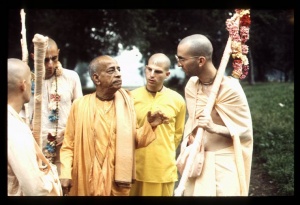SB 1.13.56: Difference between revisions
m (1 revision(s)) |
No edit summary |
||
| Line 1: | Line 1: | ||
{{info | {{info | ||
|speaker= | |speaker=Nārada Muni | ||
|listener=King | |listener=King Yudhiṣṭhira | ||
}} | }} | ||
[[Category:Srimad-Bhagavatam - Canto 01 Chapter 13]] | |||
[[Category:Bhagavatam Verses Spoken by Narada Muni - Vanisource|011356]] | |||
<div style="float:left">'''[[Srimad-Bhagavatam]] - [[SB 1|First Canto]] - [[SB 1.13: Dhrtarastra Quits Home|Chapter 13: Dhṛtarāṣṭra Quits Home]]'''</div> | |||
<div style="float:right">[[File:Go-previous.png|link=SB 1.13.55]] '''[[SB 1.13.55]] - [[SB 1.13.57]]''' [[File:Go-next.png|link=SB 1.13.57]]</div> | |||
{{CompareVersions|SB|1.13.56|SB 1965|SB 1972-77}} | |||
{{RandomImage}} | |||
==== TEXT 56 ==== | ==== TEXT 56 ==== | ||
<div class="verse"> | |||
<div | :dhvasta-māyā-guṇodarko | ||
dhvasta-māyā-guṇodarko | :niruddha-karaṇāśayaḥ | ||
niruddha-karaṇāśayaḥ | :nivartitākhilāhāra | ||
nivartitākhilāhāra | :āste sthāṇur ivācalaḥ | ||
āste sthāṇur ivācalaḥ | :tasyāntarāyo maivābhūḥ | ||
tasyāntarāyo maivābhūḥ | :sannyastākhila-karmaṇaḥ | ||
sannyastākhila-karmaṇaḥ | |||
</div> | </div> | ||
| Line 20: | Line 25: | ||
==== SYNONYMS ==== | ==== SYNONYMS ==== | ||
<div class="synonyms"> | |||
<div | ''dhvasta''—being destroyed; ''māyā-guṇa''—the modes of material nature; ''udarkaḥ''—after effects; ''niruddha''—being suspended; ''karaṇa-āśayaḥ''—the senses and the mind; ''nivartita''—stopped; ''akhila''—all; ''āhāraḥ''—food for the senses; ''āste''—is sitting; ''sthāṇuḥ''—immovable; ''iva''—like; ''acalaḥ''—fixed; ''tasya''—his; ''antarāyaḥ''—hindrances; ''mā eva''—never like that; ''abhūḥ''—be; ''sannyasta''—renounced; ''akhila''—all sorts; ''karmaṇaḥ''—material duties. | ||
</div> | </div> | ||
| Line 28: | Line 32: | ||
==== TRANSLATION ==== | ==== TRANSLATION ==== | ||
<div class="translation"> | |||
<div | |||
He will have to suspend all the actions of the senses, even from the outside, and will have to be impervious to interactions of the senses, which are influenced by the modes of material nature. After renouncing all material duties, he must become immovably established, beyond all sources of hindrances on the path. | He will have to suspend all the actions of the senses, even from the outside, and will have to be impervious to interactions of the senses, which are influenced by the modes of material nature. After renouncing all material duties, he must become immovably established, beyond all sources of hindrances on the path. | ||
</div> | </div> | ||
| Line 36: | Line 39: | ||
==== PURPORT ==== | ==== PURPORT ==== | ||
<div class="purport"> | |||
Dhṛtarāṣṭra had attained, by the yogic process, the stage of negation of all sorts of material reaction. The effects of the material modes of nature draw the victim to indefatigable desires of enjoying matter, but one can escape such false enjoyment by the yogic process. Every sense is always busy in searching for its food, and thus the conditioned soul is assaulted from all sides and has no chance to become steady in any pursuit. Mahārāja Yudhiṣṭhira was advised by Nārada not to disturb his uncle by attempting to bring him back home. He was now beyond the attraction of anything material. The material modes of nature (the ''guṇas'') have their different modes of activities, but above the material modes of nature is a spiritual mode, which is absolute. ''Nirguṇa'' means without reaction. The spiritual mode and its effect are identical; therefore the spiritual quality is distinguished from its material counterpart by the word ''nirguṇa.'' After complete suspension of the material modes of nature, one is admitted to the spiritual sphere, and action dictated by the spiritual modes is called devotional service, or ''bhakti. Bhakti'' is therefore ''nirguṇa'' attained by direct contact with the Absolute. | |||
</div> | |||
<div | |||
<div style="float:right; clear:both;">[[File:Go-previous.png|link=SB 1.13.55]] '''[[SB 1.13.55]] - [[SB 1.13.57]]''' [[File:Go-next.png|link=SB 1.13.57]]</div> | |||
</div> | __NOTOC__ | ||
__NOTOC__ | __NOEDITSECTION__ | ||
Revision as of 04:17, 2 May 2021

A.C. Bhaktivedanta Swami Prabhupada
TEXT 56
- dhvasta-māyā-guṇodarko
- niruddha-karaṇāśayaḥ
- nivartitākhilāhāra
- āste sthāṇur ivācalaḥ
- tasyāntarāyo maivābhūḥ
- sannyastākhila-karmaṇaḥ
SYNONYMS
dhvasta—being destroyed; māyā-guṇa—the modes of material nature; udarkaḥ—after effects; niruddha—being suspended; karaṇa-āśayaḥ—the senses and the mind; nivartita—stopped; akhila—all; āhāraḥ—food for the senses; āste—is sitting; sthāṇuḥ—immovable; iva—like; acalaḥ—fixed; tasya—his; antarāyaḥ—hindrances; mā eva—never like that; abhūḥ—be; sannyasta—renounced; akhila—all sorts; karmaṇaḥ—material duties.
TRANSLATION
He will have to suspend all the actions of the senses, even from the outside, and will have to be impervious to interactions of the senses, which are influenced by the modes of material nature. After renouncing all material duties, he must become immovably established, beyond all sources of hindrances on the path.
PURPORT
Dhṛtarāṣṭra had attained, by the yogic process, the stage of negation of all sorts of material reaction. The effects of the material modes of nature draw the victim to indefatigable desires of enjoying matter, but one can escape such false enjoyment by the yogic process. Every sense is always busy in searching for its food, and thus the conditioned soul is assaulted from all sides and has no chance to become steady in any pursuit. Mahārāja Yudhiṣṭhira was advised by Nārada not to disturb his uncle by attempting to bring him back home. He was now beyond the attraction of anything material. The material modes of nature (the guṇas) have their different modes of activities, but above the material modes of nature is a spiritual mode, which is absolute. Nirguṇa means without reaction. The spiritual mode and its effect are identical; therefore the spiritual quality is distinguished from its material counterpart by the word nirguṇa. After complete suspension of the material modes of nature, one is admitted to the spiritual sphere, and action dictated by the spiritual modes is called devotional service, or bhakti. Bhakti is therefore nirguṇa attained by direct contact with the Absolute.